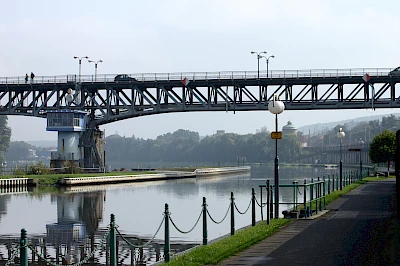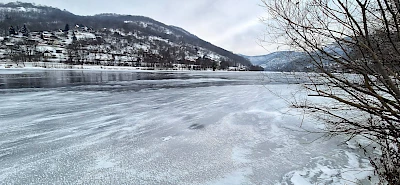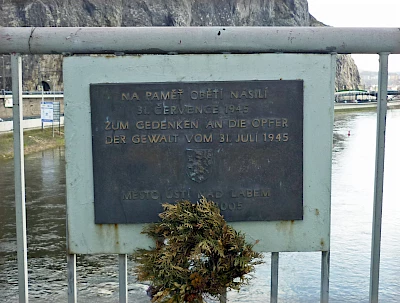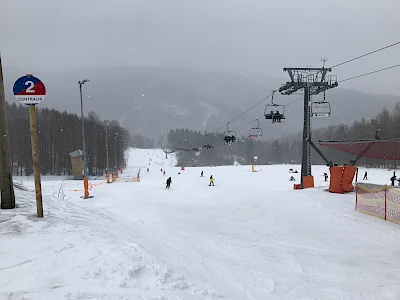Welcome to the Euroregion Elbe/Labe!
News
Babiš cabinet wins vote of confidence
The new Czech government has won the important vote of confidence in parliament. After a two-day debate, 108 MPs from the three governing parties ANO, SPD and Motorists voted in favour of the new government, with 91 against. The government needed a simple majority of all MPs to win the vote.
The government of Prime Minister Andrej Babiš (ANO) has thus cleared the final hurdle. The members of the cabinet had already been inaugurated in mid-December and had started work. The new government must face a vote of confidence in parliament within 30 days of its appointment.
In a record-breaking debate that lasted two days, opposition MPs criticized the new government's planned high spending and the threat of a growing budget deficit. The court cases against Andrej Babiš for subsidy fraud, which have already lasted four legislative periods, and for defamatory poster advertising against parliamentary speaker Tomio Okamura were also discussed. Both enjoy immunity as members of parliament. Given the majority situation, it is unlikely that their immunity will be lifted.
Solution for massive train delays

At the beginning of January, there were again massive train delays between Prague and Dresden and onwards to Berlin. The reason was again a section in Roudnice nad Labem (Raudnitz) below the Ervin Špindler Bridge, which is currently being renovated (we reported on this in issue 46/25). Due to the construction work, train drivers have to retract the pantographs for this line. In the occasional event that they forget to do so, safety hooks are used to pull down the pantographs. The result is not only a line that is blocked for hours, but also extensive damage to the locomotive, which the transport companies in particular have complained about. This has happened to 18 trains since the summer.
The new solution presented by the infrastructure management was to insulate the area around the overhead line on the bridge using Teflon rods, which were installed quickly and were probably cheaper than the many destroyed pantographs and delays to train services.
The solution of the past few months, i.e. the safety hooks that the rail infrastructure management had so vehemently defended as the only possible solution, have now become the target of ridicule and malice. There is a song about the safety hooks and a computer game in which anyone who doesn't pull in the customer quickly enough loses.
For the first time in 60 years: Elbe under ice

Although the temperatures have since dropped, a spectacle could be observed in the Elbe valley near Hřensko (Herrnskretschen) and upstream at the beginning of the week that had not been seen for at least 60 years: the Elbe was completely encased in an ice sheet. Ice floes piled up on top of it. The river almost came to a standstill.
The reason for this now rare natural spectacle was not only the extreme cold of up to -17 degrees, but also the low flow rate. It is currently at the level of a dry summer. In addition, the coal-fired power plant in Mělník took less water and therefore returned less. The water from the power plant is then usually slightly warmer than before.
The fact that this spectacle has not occurred for so long has something to do with the construction of the dams on the Vltava, which always release the water slightly warmer than it flowed into the reservoirs. The increasing connection of municipalities to sewage treatment plants also tends to produce warmer water. So a lot has to come together to create such an ice shield.
The waterway administration drew the consequences from the phenomenon and closed the waterway from the state border with Germany to the barrage in Střekov (Schreckenstein) in Ústí nad Labem (Aussig) until further notice. Since another section between Lovosice and Obříství was closed, the entire Elbe navigation between Pardubice and the state border is de facto out of service.
Another acquittal in the forest fire trial
The former ranger in the Bohemian Switzerland National Park Jiří L. was once again acquitted by the district court in Ústí nad Labem of the charge of arson in the huge forest fire in the summer of 2022. After the first acquittal almost a year ago, the public prosecutor's office appealed. The court of appeal in Prague then ordered a retrial before the district court. This again ended in an acquittal. A conviction based solely on the defendant's statements was not permissible. There was simply a lack of evidence for a valid conviction. Delays in recording evidence were also criticized. In Malinový důl (Raspberry Ground), where the fire was apparently started, a large number of people were moving around at the time, according to the court.
The devastating forest fire in the summer of 2022 destroyed large parts of the forest in the Bohemian Switzerland National Park, which is still visible today. The fire had also spread to the German side of the Great Winter Mountain area. In Mezná (Stimmersdorf), the fire completely destroyed three houses. Miraculously, no people or other houses were harmed.
Czech Republic disarms
Illegal gun ownership is also a problem in the Czech Republic. The police are using a new weapons law to grant the sixth amnesty for illegally held weapons. From 1 January until the end of June, these can be handed in or legalized at any police station without penalty. The officers do not ask about the origin of the weapons, it is said.
According to the police, over 200 weapons and more than 2,000 pieces of ammunition have already been handed in since the beginning of the year. During the last weapons amnesty in 2021, the police received over 3,800 weapons and 133,000 pieces of ammunition. Weapons ownership in the Czech Republic is steadily increasing. More than one million weapons were registered last year. The number of gun licenses rose to over 324,000. The Czech Republic has a population of over 10 million.
Glass from Chřibská again?
Chřibská (Kreibitz) in Bohemian Lusatia was once home to one of the oldest glassworks in the world. However, the glassworks, founded in 1414, was closed in 2007. At the time, it was considered the oldest in the Czech Republic. Attempts are now being made to bring glass production back to Chřibská in the form of glassblowing. Although production does not take place at the historic site, an extension to the rectory could become the new home of glass in the future. The Association of Friends of the Chřibská Glassworks currently operates the glassworks on the property of one of its members. Jaroslav Veselý, a founding member of the association, worked at the old glassworks until 2007 and there is a great deal of interest in the handmade glass products, including from abroad.
The glassblowing workshop is only the first step. The association urgently needs premises. It receives support from the municipality. However, subsidies are needed for the extension to the vicarage, as the parish itself does not have the money. The second major problem facing the Glass Friends is their age. They urgently need new blood and are hoping for apprentices from glass schools.
Northern Bohemia is famous for its glass art. The most important centers are located in Kamenický Šenov (Steinschönau), Nový Bor (Haida) and Železný Brod (Eisenbrod).
(This is an automatic translation by DeepL Translator.)
Bishop commemorates expulsion

2026 should be the year of healing, says the Bishop of Litoměřice, Stanislav Přibyl. In a pastoral letter, he called for reconciliation in the diocese. This includes the entire Ústí (Aussig) district and large parts of the Liberec (Reichenberg) district as well as parts of Central Bohemia. Bishop Přibyl refers to the Catholic Ackermann community, which was founded 80 years ago on January 13 and has been striving for reconciliation from the very beginning. The first reconciliation mass in the diocese will also take place on January 13 in Filipov (Philippsdorf) on the border with Lusatia in Saxony, where the healing miracle of Magdalena Kade took place on this day. Mary, the Mother of God, appeared to her with the words "From now on it heals". The displaced Catholic Sudeten Germans understood these words in 1946 as hope for reconciliation between Germans and Czechs. A second reason for the Year of Reconciliation is the 80th anniversary of the expulsion of the Germans from Czechoslovakia. After the first wild phase in 1945, it took place mainly in 1946.
In addition to Filipov, further reconciliation masses and commemorative events are planned in Terezín, Postoloprty, Žatec, Ústí nad Labem, Osek, Česká Kamenice and Česká Lípa. These are sites of crimes against Sudeten Germans, but also of National Socialist tyranny.
2026 is also the year in which Sudeten German Day will take place for the first time in the Czech Republic, in Brno. Brno, where a death march to the border with Austria took place in 1945, had already proclaimed a year of reconciliation ten years ago.
Snow causes obstructions and skiing fun

Storm Elli also caused disruptions in the Czech Republic today. Large parts of southern and northern Bohemia and central Bohemia, including the capital Prague, were particularly affected. Due to the heavy snowfall, the roads could not be cleared in time, which is why there were sometimes severe delays in public transport in the cities. Trains and regional transport were also affected. There were traffic jams on the Czech side of the Prague-Dresden highway. However, there were initially no major accidents.
On the other hand, the rain of snow means that the opening of ski resorts is accelerating. The entire ski area in Klíny will open on Friday evening. This means that the four-seater chairlift will also be in operation and not just the T-bar lift. In Telnice and Český Jiřetín, the major ski slopes such as Macháček and Piste 1 will open on Saturday. In Telnice, the four-seater chairlift will also be put into operation at the same time. At Bouřňák (Stürmer) near Mikulov, it was still uncertain whether the important slalom slope would open on Saturday.
Conditions are also good for cross-country skiers. The trails in the Bohemian Ore Mountains are regularly groomed thanks to good snow conditions. You can follow the current condition of the trails on the winter map at mapy.com.
New visitor center planned in Bohemian Switzerland
The Bohemian Switzerland National Park is planning to set up a new visitor center in Mezní Louka (Rainwiese). A building owned by the national park is to be used for this purpose. Together with an extension to the nearby Luchsweg adventure area, it should be completed by 2028. The costs amount to the equivalent of 5.5 million euros. The new center will house an exhibition dedicated to nature in the national park, as well as the recovery of the forest after the major forest fire in the summer of 2022. The national park is also planning a trail off the road between Mezní Louka and Mezná (Stimmersdorf). Preparations are also to be made for the renovation of the hiking trail from Tři prameny (Three Springs) to Pravčická brána (Pravčická Gate). A study is to be carried out for the safe reopening of the Gabrielensteig trail, which has been closed since summer 2022. No date has been set for the reopening of the popular hiking trail.
Canceled fireworks displays and toothless pyro ban
The farewell to the old year 2025 was the first in the Czech Republic after the comprehensive restrictions on the use of pyrotechnics, which have been regulated by law since the beginning of December 2025. According to media reports, it was relatively quiet on New Year's Eve in northern Bohemia. The number of emergency services deployed was also on a par with the previous year. However, the ban on pyrotechnics proved to be rather toothless. Since last year, there have been some large areas where the use of pyrotechnics is prohibited, e.g. near hospitals, animal shelters or zoos. The only exceptions are class F1 firecrackers, i.e. sparklers and other children's firecrackers.
However, a reporter for the daily newspaper Děčínský děník witnessed rockets being set off on Masaryk Square in Děčín without the police intervening or punishing anyone. In the entire Ústí district, there were just 46 reports in connection with the use of pyrotechnics. Of these, 17 cases were prosecuted as administrative penalties, according to the police. In Děčín, however, where unauthorized use was observed, there were no fines at all. In Ústí nad Labem, too, not a single complaint was made, although private fireworks were also used there. The police excused this by saying that they already had enough to do with ensuring safety and order. It is also relatively complicated to convict someone of the unauthorized use of pyrotechnics. "The only effective measure would be a ban on the sale of pyrotechnics," says Marcel Horák, head of the Děčín City Police. The new situation also absurdly leads to people setting off fireworks in the countryside far away from residential areas to make sure they are not in a prohibited zone.
The police chief is not alone in his opinion that the sale of pyrotechnics should be banned. Many official fireworks displays have also been canceled due to the new legal situation. They are not feasible under the new conditions. Only in a few places, such as Litvínov or Ústí, did the municipal fireworks display take place. But even these towns are considering celebrating differently in a year's time. In Most, the traditional fireworks display on the local hill Hněvín was canceled and replaced by a light show and video mapping on building facades.
On a positive note, the emergency services were only called out to 170 patients in the entire Ústí region on New Year's Eve. The number remained unchanged compared to the previous year. The number of people injured by fireworks was even lower, although three children were among the injured.
Czech Republic continues ammunition initiative
The Czech Republic will continue to organize ammunition for Ukraine. Prime Minister Andrej Babiš made this clear after the meeting of the coalition of the willing in Paris. However, the Czech Republic will no longer participate financially. The Czech Republic is organizing the ammunition together with Denmark and the Netherlands. The Czech Republic's financial contribution has so far been in the very low range of two to three percent. The most important donors are Germany, Canada and the Netherlands.
The ANO and SPD parties had announced in the election campaign before the parliamentary elections in the fall that they would abandon the ammunition initiative. Now the ANO has changed its mind. The motorists' party Motoristé was in favor of a continuation anyway. The radical SPD is now talking about a compromise in which the main thing is that no more Czech money will be spent on it. Foreign Minister Petr Macinka said that abandoning the initiative would have been a major problem, especially for the Czech Republic. The initiative, which was launched under the previous government and with the great help of President Petr Pavel, would have given the country enormous prestige.
If you would like to receive our weekly review regularly in your e-mail inbox, sign up for our newsletter.
(This is an automatic translation by DeepL Translator.)
All news you'll find here.
Next events
More events you find here.
